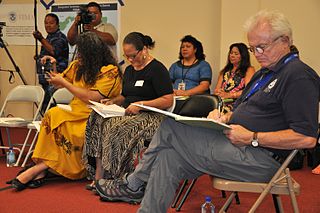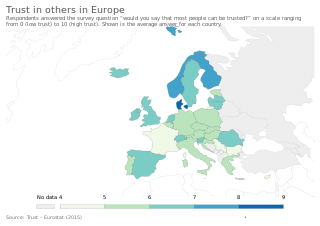Related Research Articles
Business ethics is a form of applied ethics or professional ethics, that examines ethical principles and moral or ethical problems that can arise in a business environment. It applies to all aspects of business conduct and is relevant to the conduct of individuals and entire organizations. These ethics originate from individuals, organizational statements or the legal system. These norms, values, ethical, and unethical practices are the principles that guide a business.
Ethics or moral philosophy is the philosophical study of moral phenomena. It investigates normative questions about what people ought to do or which behavior is morally right. It is usually divided into three major fields: normative ethics, applied ethics, and metaethics.

Francis Yoshihiro Fukuyama is an American political scientist, political economist, international relations scholar, and writer.

Public relations (PR) is the practice of managing and disseminating information from an individual or an organization to the public in order to influence their perception. Public relations and publicity differ in that PR is controlled internally, whereas publicity is not controlled and contributed by external parties. Public relations may include an organization or individual gaining exposure to their audiences using topics of public interest and news items that do not require direct payment. The exposure is mostly media-based, and this differentiates it from advertising as a form of marketing communications. Public relations aims to create or obtain coverage for clients for free, also known as earned media, rather than paying for marketing or advertising also known as paid media. But in the early 21st century, advertising is also a part of broader PR activities.

Morality is the differentiation of intentions, decisions and actions between those that are distinguished as proper (right) and those that are improper (wrong). Morality can be a body of standards or principles derived from a code of conduct from a particular philosophy, religion or culture, or it can derive from a standard that a person believes should be universal. Morality may also be specifically synonymous with "goodness", "appropriateness" or "rightness".
Guanxi is a term used in Chinese culture to describe an individual's social network of mutually beneficial personal and business relationships. The character guan, 关, means “closed” and "caring" while the character xi 系 means “system” and together the term refers to a closed caring system of relationships that is somewhat analogous to the term old boy's network in the West. In Western media, the pinyin romanization guanxi is more widely used than common translations such as "connections" or "relationships" because those terms do not capture the significance of a person's guanxi to most personal and business dealings in China. Unlike in the West, guanxi relationships are almost never established purely through formal meetings but must also include spending time to get to know each other during tea sessions, dinner banquets, or other personal meetings. Essentially, guanxi requires a personal bond before any business relationship can develop. As a result, guanxi relationships are often more tightly bound than relationships in Western personal social networks. Guanxi has a major influence on the management of businesses based in mainland China, Hong Kong, and those owned by Overseas Chinese people in Southeast Asia.
Integrity is the quality of being honest and showing a consistent and uncompromising adherence to strong moral and ethical principles and values. In ethics, integrity is regarded as the honesty and truthfulness or earnestness of one's actions. Integrity can stand in opposition to hypocrisy. It regards internal consistency as a virtue, and suggests that people who hold apparently conflicting values should account for the discrepancy or alter those values.
Organizational culture refers to culture related to organizations including schools, universities, not-for-profit groups, government agencies, and business entities. Alternative terms include corporate culture and company culture. The term corporate culture emerged in the late 1980s and early 1990s. It was used by managers, sociologists, and organizational theorists in the 1980s.

Corporate social responsibility (CSR) or corporate social impact is a form of international private business self-regulation which aims to contribute to societal goals of a philanthropic, activist, or charitable nature by engaging in, with, or supporting professional service volunteering through pro bono programs, community development, administering monetary grants to non-profit organizations for the public benefit, or to conduct ethically oriented business and investment practices. While once it was possible to describe CSR as an internal organizational policy or a corporate ethic strategy similar to what is now known today as Environmental, Social, Governance (ESG); that time has passed as various companies have pledged to go beyond that or have been mandated or incentivized by governments to have a better impact on the surrounding community. In addition, national and international standards, laws, and business models have been developed to facilitate and incentivize this phenomenon. Various organizations have used their authority to push it beyond individual or industry-wide initiatives. In contrast, it has been considered a form of corporate self-regulation for some time, over the last decade or so it has moved considerably from voluntary decisions at the level of individual organizations to mandatory schemes at regional, national, and international levels. Moreover, scholars and firms are using the term "creating shared value", an extension of corporate social responsibility, to explain ways of doing business in a socially responsible way while making profits.
Welfare economics is a field of economics that applies microeconomic techniques to evaluate the overall well-being (welfare) of a society. This evaluation is typically done at the economy-wide level, and attempts to assess the distribution of resources and opportunities among members of society.
Ethical consumerism is a type of consumer activism based on the concept of dollar voting. People practice it by buying ethically made products that support small-scale manufacturers or local artisans and protect animals and the environment, while boycotting products that exploit children as workers, are tested on animals, or damage the environment.

Trust is the belief that another person will do what is expected. It brings with it a willingness for one party to become vulnerable to another party, on the presumption that the trustee will act in ways that benefit the trustor. In addition, the trustor does not have control over the actions of the trustee. Scholars distinguish between generalized trust, which is the extension of trust to a relatively large circle of unfamiliar others, and particularized trust, which is contingent on a specific situation or a specific relationship.
Power distance is the unequal distribution of power between parties, and the level of acceptance of that inequality; whether it is in the family, workplace, or other organizations.
Professional responsibility is a set of duties within the concept of professional ethics for those who exercise a unique set of knowledge and skill as professionals.
Corporate behaviour is the actions of a company or group who are acting as a single body. It defines the company's ethical strategies and describes the image of the company. Studies on corporate behaviour show the link between corporate communication and the formation of its identity.
In ethics and social sciences, value denotes the degree of importance of some thing or action, with the aim of determining which actions are best to do or what way is best to live, or to describe the significance of different actions. Value systems are proscriptive and prescriptive beliefs; they affect the ethical behavior of a person or are the basis of their intentional activities. Often primary values are strong and secondary values are suitable for changes. What makes an action valuable may in turn depend on the ethical values of the objects it increases, decreases, or alters. An object with "ethic value" may be termed an "ethic or philosophic good".

An ethical bank, also known as a social, alternative, civic, or sustainable bank, is a bank concerned with the social and environmental impacts of its investments and loans. The ethical banking movement includes: ethical investment, impact investment, socially responsible investment, corporate social responsibility, and is also related to such movements as the fair trade movement, ethical consumerism, and social enterprise.
Greenberg (1987) introduced the concept of organizational justice with regard to how an employee judges the behavior of the organization and the employee's resulting attitude and behaviour. For example, if a firm makes redundant half of the workers, an employee may feel a sense of injustice with a resulting change in attitude and a drop in productivity.
Organizational ethics is the ethics of an organization, and it is how an organization responds to an internal or external stimulus. Organizational ethics is interdependent with the organizational culture. Although it is to both organizational behavior and industrial and organizational psychology as well as business ethics on the micro and macro levels, organizational ethics is neither organizational behavior nor industrial and organizational psychology, nor is it solely business ethics. Organizational ethics express the values of an organization to its employees and/or other entities irrespective of governmental and/or regulatory laws.
Ethics in the public sector is a broad topic that is usually considered a branch of political ethics. In the public sector, ethics addresses the fundamental premise of a public administrator's duty as a "steward" to the public. In other words, it is the moral justification and consideration for decisions and actions made during the completion of daily duties when working to provide the general services of government and nonprofit organizations. Ethics is defined as, among others, the entirety of rules of proper moral conduct corresponding to the ideology of a particular society or organization (Eduard). Public sector ethics is a broad topic because values and morals vary between cultures. Despite the differences in ethical values, there is a growing common ground of what is considered good conduct and correct conduct with ethics. Ethics are an accountability standard by which the public will scrutinize the work being conducted by the members of these organizations. The question of ethics emerges in the public sector on account of its subordinate character.
References
- 1 2 3 Natale, Hoffman & Hayward 1998, p. 35.
- ↑ Govier 1997, p. 132.
- ↑ Rose 2011, p. 196.
- ↑ LEWIS, Richard. When cultures collide: Leading across cultures. Nicholas Brealey International, 2010.
- ↑ Hopkins 2012, p. 120.
- ↑ TRUST by Francis Fukuyama.
Sources
- Govier, T. (1997). Social Trust and Human Communities. Social Trust and Human Communities. McGill-Queen's University Press. ISBN 978-0-7735-1680-9.
- Natale, S.M.; Hoffman, R.P.; Hayward, G. (1998). Business Education and Training: Corporate Structures, Business, and the Management of Values. Business education and training : a value-laden process. University Press of America. ISBN 978-0-7618-1003-2.
- Rose, D.C. (2011). The Moral Foundation of Economic Behavior. Oxford University Press. ISBN 978-0-19-978177-5.
- Hopkins, B. (2012). Cultural Differences and Improving Performance: How Values and Beliefs Influence Organizational Performance. Ashgate Publishing Limited. ISBN 978-1-4094-5862-3.